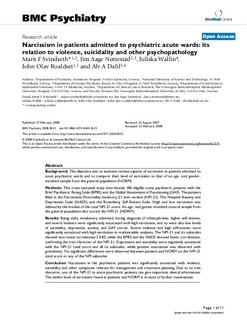| dc.contributor.author | Svindseth, Marit F. | |
| dc.contributor.author | Nottestad, JA | |
| dc.contributor.author | Nøttestad, Jim Aage | |
| dc.contributor.author | Wallin, Juliska | |
| dc.contributor.author | Roaldset, John Olav | |
| dc.contributor.author | Dahl, Alv A | |
| dc.date.accessioned | 2015-09-11T12:53:52Z | |
| dc.date.accessioned | 2015-09-29T13:14:18Z | |
| dc.date.available | 2015-09-11T12:53:52Z | |
| dc.date.available | 2015-09-29T13:14:18Z | |
| dc.date.issued | 2008 | |
| dc.identifier.citation | BMC Psychiatry 2008, 8(13) | nb_NO |
| dc.identifier.issn | 1471-244X | |
| dc.identifier.uri | http://hdl.handle.net/11250/397479 | |
| dc.description.abstract | Background: The objective was to examine various aspects of narcissism in patients admitted to
acute psychiatric wards and to compare their level of narcissism to that of an age- and gendermatched
sample from the general population (NORM).
Methods: This cross-sectional study interviewed 186 eligible acute psychiatric patients with the
Brief Psychiatric Rating Scale (BPRS) and the Global Assessment of Functioning (GAF). The patients
filled in the Narcissistic Personality Inventory-21 item version (NPI-21), The Hospital Anxiety and
Depression Scale (HADS) and the Rosenberg Self-Esteem Scale. High and low narcissism was
defined by the median of the total NPI-21 score. An age- and gender-matched control sample from
the general population also scored the NPI-21 (NORM).
Results: Being male, involuntary admitted, having diagnosis of schizophrenia, higher self-esteem,
and severe violence were significantly associated with high narcissism, and so were also low levels
of suicidality, depression, anxiety and GAF scores. Severe violence and high self-esteem were
significantly associated with high narcissism in multivariable analyses. The NPI-21 and its subscales
showed test-retest correlations ≥0.83, while the BPRS and the HADS showed lower correlations,
confirming the trait character of the NPI-21. Depression and suicidality were negatively associated
with the NPI-21 total score and all its subscales, while positive association was observed with
grandiosity. No significant differences were observed between patients and NORM on the NPI-21
total score or any of the NPI subscales.
Conclusion: Narcissism in the psychiatric patients was significantly associated with violence,
suicidality and other symptoms relevant for management and treatment planning. Due to its trait
character, use of the NPI-21 in acute psychiatric patients can give important clinical information.
The similar level of narcissism found in patients and NORM is in need of further examination. | nb_NO |
| dc.language.iso | eng | nb_NO |
| dc.publisher | BioMed Central | nb_NO |
| dc.title | Narcissism in patients admitted to psychiatric acute wards: its relation to violence, suicidality and other psychopathology | nb_NO |
| dc.type | Journal article | nb_NO |
| dc.type | Peer reviewed | en_GB |
| dc.date.updated | 2015-09-11T12:53:52Z | |
| dc.source.volume | 8 | nb_NO |
| dc.source.journal | BMC Psychiatry | nb_NO |
| dc.source.issue | 13 | nb_NO |
| dc.identifier.doi | 10.1186/1 471-244X-8-13 | |
| dc.identifier.cristin | 361277 | |
| dc.description.localcode | © 2008 Svindseth et al; licensee BioMed Central Ltd. This is an Open Access article distributed under the terms of the Creative Commons Attribution License (http://creativecommons.org/licenses/by/2.0), which permits unrestricted use, distribution, and reproduction in any medium, provided the original work is properly cited. | nb_NO |
